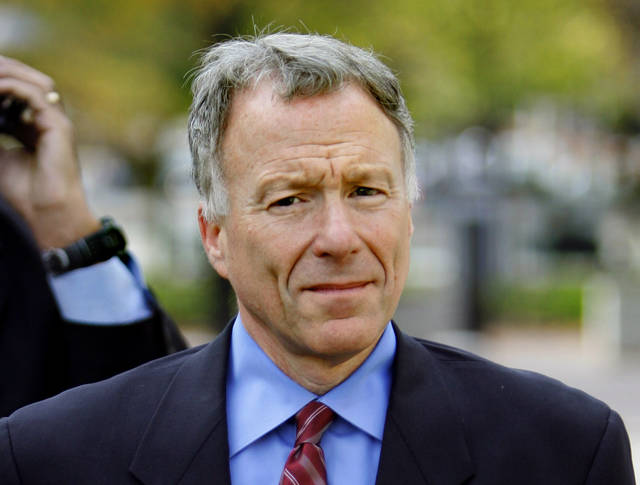WASHINGTON — President Donald Trump issued a full pardon Friday to I. Lewis “Scooter” Libby, suggesting the former top aide to Vice President Dick Cheney had been “treated unfairly” by a special counsel at a moment when the president himself faces an escalating special counsel investigation.
Libby, Cheney’s former chief of staff, was convicted in 2007 of lying to investigators and obstruction of justice following the 2003 leak of the covert identity of CIA officer Valerie Plame. President George W. Bush later commuted Libby’s 30-month prison sentence but didn’t issue a pardon despite intense pressure from Cheney.
“I don’t know Mr. Libby,” Trump said in a statement issued by White House spokeswoman Sarah Huckabee Sanders, “but for years I have heard that he has been treated unfairly. Hopefully, this full pardon will help rectify a very sad portion of his life.”
Trump pardoned Libby in a case that dealt with leaks to the press despite the fact that he has raged against press leaks and excoriated “leakers” throughout his presidency.
The White House said a witness against Libby later changed her version of events and noted that he had a decade of public service and an “unblemished” record since. He had already been reinstated to the bar by the District of Columbia Court of Appeals.
Libby’s case has been criticized by conservatives, who argue he was the victim of an overly zealous and politically motivated prosecution by a special counsel. Another twist is that the special counsel in Libby’s case, Patrick Fitzgerald, was appointed by James Comey, deputy attorney general at the time. Comey later became head of the FBI but was fired by Trump and has since written a book highly critical of the president.
The criticism echoes critiques of Robert Mueller, the special counsel leading an investigation into Russian interference in the 2016 U.S. presidential election, possible coordination with Trump associates and potential obstruction of justice by the president. Trump has called that probe a “witch hunt.”
Libby’s attorneys, Joseph diGenova and Victoria Toensing, issued a statement thanking Trump for “addressing a gross injustice” they said was inflicted by Fitzgerald and Comey. Trump knows the attorneys and had sought to add them to his legal team in the Russian investigation, but it was determined diGenova and Toensing had conflicts of interest that would prevent them from joining.
Toensing told the Associated Press that she submitted the pardon papers for Libby to the White House counsel’s office last summer. She said the president called her midday Friday to deliver the news.
“He said, ‘He got screwed,’” Toensing recalled.
A spokesman for Bush said Friday that the former president was “very pleased” for Libby and his family.
Critics questioned the timing of the pardon. Earlier in the day, with rumors floating that a pardon was likely, Democratic Rep. Jerrold Nadler of New York, ranking member of the House Judiciary Committee, said the timing was “suspect.”
“It hasn’t been done through the normal channels. He hasn’t gone through the pardon office. And there’s no particular reason to pardon Scooter Libby,” Nadler said. “So one certainly suspects there’s a message.”
White House counselor Kellyanne Conway earlier Friday said, “Many people think that Scooter Libby was the victim of a special counsel gone amok.” Asked if a pardon would effectively be sending a message to Comey, Conway said no.
Plame appeared on MSNBC on Friday morning and said a pardon would signal “that you can commit crimes against national security and you will be pardoned.”
The pardon was the third for Trump. He granted one last year for former Arizona sheriff Joe Arpaio, who was awaiting sentencing for contempt of court. Trump also pardoned a U.S. Navy sailor who was convicted of taking photos of classified portions of a submarine.
———
Associated Press writer Kevin Freking contributed to this report.


